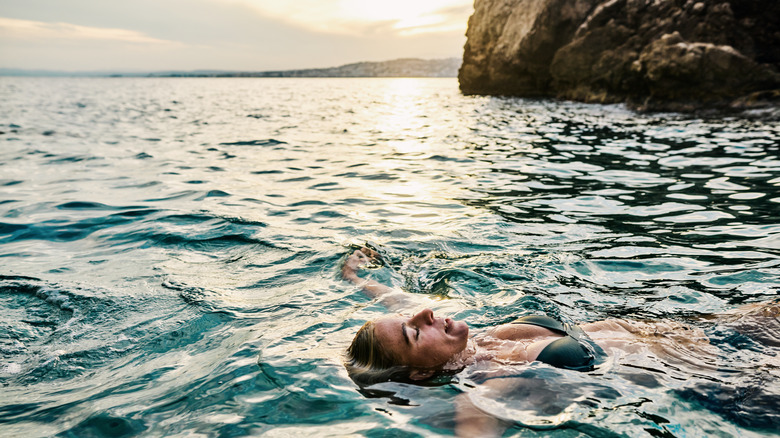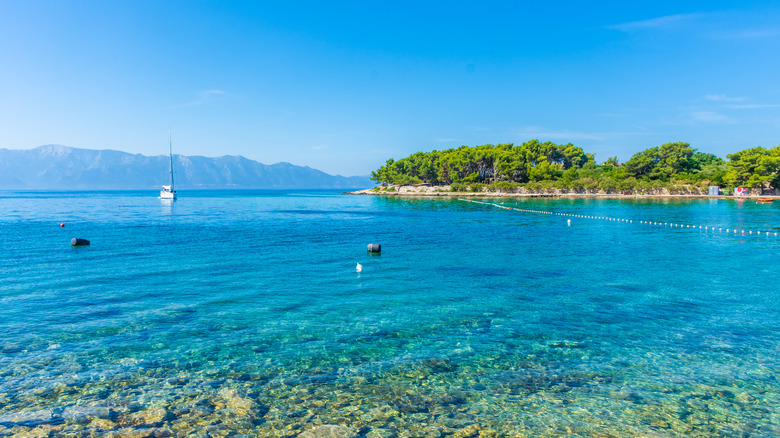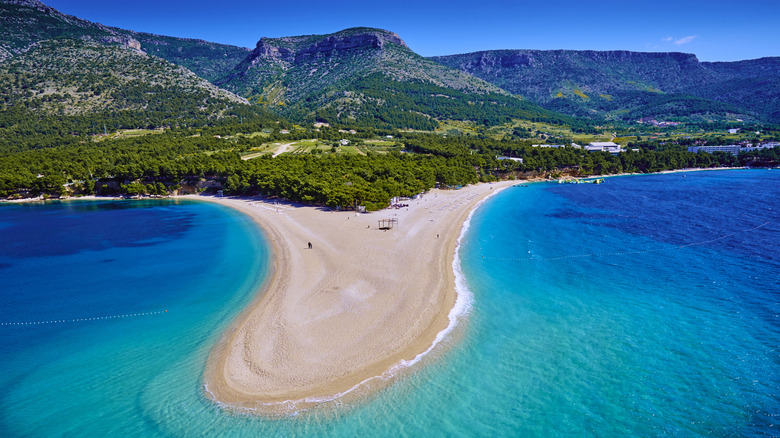The Wildly Underrated Country With The Cleanest Water For Swimming In All Of Europe
If you're a "Game of Thrones" fan, Croatia is probably on your bucket list of places to visit. Dubrovnik and Split, two cities in this crescent-shaped country on the northwestern part of the Balkan Peninsula, were filming locations for some of the scenes in the popular HBO blockbuster series. Aside from the beautiful settings, the country also has warm weather islands ideal for a budget-friendly vacation. There really is a lot to see and do here, from exploring the medieval landscape and taking in the delicious food and wine to admiring the beauty of the rugged cliffs and 1,700 miles of mainland coastline. Croatia is truly one of Europe's best-kept secrets.
There's something else that stands out in this underrated European country: Azure, clean, and clear waters. In fact, according to a report by the European Environment Agency, which monitored 22,081 bathing sites across Europe, Croatia was among the top four, with 96.7% of the waters in excellent bathing quality. The assessment included all of the European Union member states, plus Albania and Switzerland through 2023.
We don't often think about how clean the waters we swim in are, until of course, we see debris floating around or realize that the murkiness is actually off-putting. In Croatia, you'll be treated to crystal-clear waters, perfect for swimming, snorkeling, and diving. So, what makes this nation's waters so clean?
The reason why Croatia's oceans are so clean
Believe it or not, there's some geography, biology, and country-specific commitment behind why Croatia's waters are so clean. The country is set against the Adriatic Sea, which receives sediments and nutrients from the many rivers that connect to it, like the Italian rivers of Po and Adige, and the Neretva in Croatia. The pristine blue of the ocean is often attributed to the fact that it's connected to the Mediterranean Sea, which has a high concentration of salt. The Adriatic is also warm, thanks to its geographic location in relation to Africa.
Clear and warm waters are the perfect environment for phytoplankton to thrive, as these are microscopic organisms that are a key part of ocean and freshwater ecosystems. They release oxygen and absorb carbon dioxide which essentially means clearer waters, and the sediments and phytoplankton also contribute to the ocean's hue.
Croatia is committed to making sure its waters remain unpolluted. For example, this European country complies with the International Maritime Organisation's Annex IV to MARPOL, in an effort to combat pollution by ships. There are also projects like the Interreg PEPSEA — Protecting the Enclosed Parts of the Sea in Adriatic — from pollution. They focus on reducing the impact of natural and man-made disasters on the waters that surround their land. Even so, tourism is a concern when it comes to keeping the Adriatic Sea the way it is.
How visitors can help keep the waters clean
If you're eager to swim in waters that are so pristine you can see the rocks at the bottom, Croatia is a definite must-visit. But, again, that's not all this European nation has to offer. The popular city of Dubrovnik boasts fascinating history, charming nightlife, and remnants of the Roman empire. The Dalmatian coast is another wonder in Croatia, with the coastline made up of limestone, and it's actually one of the most-visited places in the nation.
Other attractions include the Pelješac Bridge, which connects the mainland to the Pelješac peninsula, Galešnjak island, which is shaped like a heart, and Dugi Otok, the island that houses the tallest lighthouse in the Adriatic Sea. There's a seaside Croatian town which is like Venice minus the crowds, too. There's so much to see inland as well, although the waters may not be as clean here. Even so, you can explore waterfalls, lush greenery, and beautiful lakes.
As a tourist, there are things you can do while island hopping in Croatia to help keep the country's waters clean. Being mindful of plastic pollution might be a good place to start. According to Croatian environmentalist, Mosor Prvan (via Balkan Insight), the plastic waste in Croatia (a lot of which comes from tourists) is endangering marine and human life. Take your rubbish with you and make sure you dispose of them properly.


